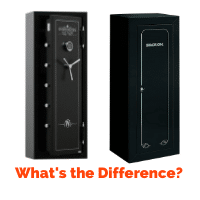The Law
The United States is permissive compared to other countries about gun ownership, but there are a few federal limits. Further, ownership laws can vary by state, so what’s legal in one area may not be allowed in others. Here’s a rundown of the law in 2021, as well as answers to questions like, “will a DUI stop me from buying a gun?”
The primary piece of federal law that’s relevant to gun ownership is the National Firearms Act of 1934, as well as the primary amendments added through the Gun Control Act of 1968. While other laws have occasionally touched on firearms ownership, these two acts are the primary legislation that matters to most people.
Minor legislation includes things like the Brady Law, which imposed waiting periods in some places but didn’t significantly alter gun ownership laws.
Can You Own a Gun If You Have a Felony?
Federal law generally prohibits owning a gun if you’ve been convicted of a federal felony. State crimes that are either not misdemeanors and punishable by over one year in prison or are misdemeanors but imprison you for more than two years can also limit your ownership rights.
Are There Any Felonies That Will Still Allow You to Have a Firearm?
There are a few cases where you can commit a felony and still own a gun. This is most notable on the state level, as long as you don’t run afoul of the federal guidelines listed above.
In particular, Kentucky and Wyoming have some guidelines where felons can still own a gun after a pardon, while Louisiana, Minnesota, and South Dakota remove restrictions over time.
Will a DUI Stop Me From Buying a Gun?
That depends on the situation. For example, Washington state will charge a DUI as a felony under certain circumstances (like having too many of them) but otherwise will charge them as misdemeanors.
In short, the only way to answer questions like “will a DUI stop me from buying a gun?” is to look at your state’s laws. You probably won’t lose gun ownership rights for a first offense, especially if you’re still young, but serious offenses that escalate charges could result in loss of ownership rights.
When Is It Illegal to Own a Gun?
States mostly follow federal guidelines for restrictions on gun ownership. The limits on possessing or acquiring firearms are, thus, broadly as follows.
Conviction/Indictment for Certain Crimes
As mentioned above, federal crimes involving imprisonment for over a year (i.e., most felonies), as well as many state crimes, can result in loss of ownership right for firearms.
This is not limited to conviction. You also lose the right to buy firearms if you are under indictment. This means you cannot buy a gun if a prosecutor files an indictment with a federal court, usually after a grand jury decides there is probable cause for the matter.
You Are a Fugitive From Justice
According to the law, fugitives are people fleeing from the government to avoid prosecution or giving testimony, as well as people who know charges are pending and leave the area. Note that you are not a fugitive if you are unaware of any pending charges.
You Are Addicted to or Are an Unlawful User of Controlled Substances
This means that you do not lose the right to own a firearm if you’re a lawful user of controlled substances. In most cases, this means a doctor has prescribed it. However, some substances are illegal at the federal level while still legal at the state level.
This means marijuana users, for example, cannot own guns under federal law. That may change with future legislation, but as of the time we wrote this guide, these are the regulations.
You’re Too Young
Federal law broadly prohibits people from buying handguns if they’re under 18 years old, although licensed dealers are limited to people 21 and older. Only licensed dealers can sell long guns (like rifles and shotguns), and these are also limited to people 18 or older.
States have different laws on buying and possessing guns. Note that possessing and using a firearm is not the same thing, legally speaking, as owning one. Many states set 21 as the limit but could allow people as young as 14 to possess a firearm under certain conditions.
A Lawful Authority Finds You Dangerous or Unable to Manage Yourself
In this context, lawful authorities include courts, commissions, boards, and any other group designated by law as having the power to generate such findings. In general, if such a group believes that you are either a danger to someone (including yourself) or you lack the mental capacity for ownership, they can restrict it.
This limitation specifically does apply if you’re found incompetent to stand trial or if mental incapacity leads to a court finding you not guilty of a crime.
You Are Involuntarily Hospitalized
Specifically, this applies to mental health and substance abuse treatment. If you voluntarily attend, or you’re only there for short-term observation, you don’t lose any gun ownership rights.
You’re Not in the US Legally
Illegal immigrants cannot lawfully purchase firearms. Similarly, visitors on nonimmigrant visas cannot buy guys in America.
You Were Dishonorably Discharged From the US Military
Honorable discharge is one thing, but dishonorable discharges from the military usually only occur as a result of a court-martial for a problem like murder or desertion. This is one of several types of discharges but is unambiguously the most punishing.
You Renounce Your Citizenship
Just as illegal immigrants cannot buy guns, people who renounce their citizenship can’t buy them. In short, you need to be a legal citizen, or at least possess an immigrant visa, to get a gun.
You’re Subject to Certain Restraining Orders
Active restraining orders against harassing, stalking, or threatening people, or engaging in certain other conduct, can prevent you from buying and using a firearm. Note that these mostly don’t apply if the restraining order ends.
You’ve Been Convicted of a Misdemeanor Domestic Violence Offense
Some types of domestic violence offenses can result in the loss of firearm ownership rights. However, these laws are complex, and there are some gaps.




